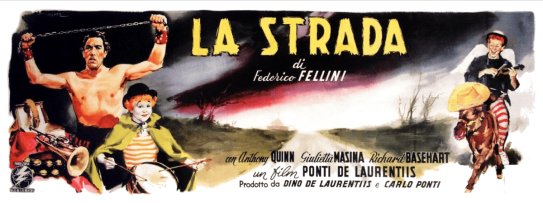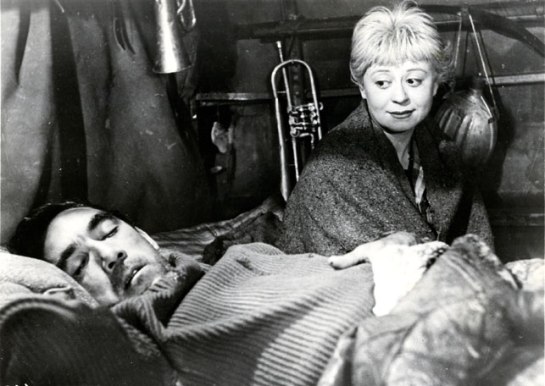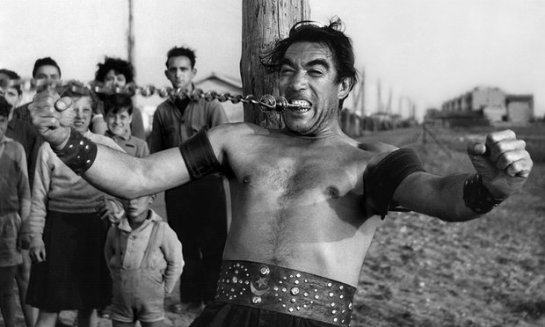
When venturing through Federico Fellini’s brilliant filmography you witness an unmistakable shift in his style of filmmaking and storytelling. From his roots as an Italian neo-realist to his more fantastical experimental pictures, Fellini made films that were identifiable and personal. He didn’t mind changing his style in order to make a more honest picture.
At the start of his transitional period sits “La Strada”, one of Fellini’s more strenuous and intimate projects. According to biographer Tullio Kezich, Fellini said the film was “a dangerous representation of my identity that was undertaken with no precedent whatsoever.” His internal and external struggles with making the film were significant.
Fellini had a difficult time getting the project financed and he was constantly maneuvering through various budget restraints. There were also casting conflicts. Fellini’s wife Giulietta Masina was a big part of his inspiration for the story and for him casting her was essential despite objections from the producers. Anthony Quinn passed on the role despite numerous requests from Fellini. It wasn’t until he saw “I Vitelloni” that he was convinced of Fellini’s abilities as a filmmaker. Injuries, several delays, and crew changes made things even more difficult.

But the emotional pressures were far more taxing than the production problems. The concept sprang from memories and images from his childhood, most of them troubling and unpleasant. The production issues were stressful for Fellini leading to severe bouts with depression and an eventual nervous breakdown. With the help of his wife and medical treatment Fellini was able to finish the film.
Like many true classics the movie wasn’t initially met with universal acclaim. Several critics blistered Fellini saying he had gotten away from the strengths of neo-realism. Despite the smattering of negativity “La Strada” had its fans and it received the first ever Academy Award for a foreign language film. Over the years critics and filmmakers have grown to appreciate its vision and influence even more.
The story begins with a young woman named Gelsomina (Masina) finding out her sister has died while working for a brutish traveling street performer named Zampanò (Quinn). In the face of poverty Gelsomina’s mother sells her to Zampanò to serve as his assistant. The two take Zampanò’s strongman act from town to town with Gelsomina playing his clown and passing around his hat for money.

For the simple and waifish Gelsomina it is a tough new world. She looks at everything through an innocent and naive lens. That’s what makes Zampanò such a despicable character. He treats her as worthless and disposable. His mental and physical abuse is abhorrent and it’s often met with confusion by Gelsomina. But she feels confined to her situation. The idea of leaving Zampanò surfaces several times in the film, but she never sees them as a viable option. Instead these two character archetypes travel on together, both bound to a situation that is certain to end poorly.
In many ways Fellini’s film is a tragedy. Others have viewed it as an inspirational piece. Regardless this is an instance where the film’s meaningful complexities serve as evidence of its greatness. It clearly shows a director branching off from his roots and exploring things foreign to the popular trends of the time. The story is beautifully poetic and painfully heartbreaking at the same time and the performances from Quinn and Masina are so good.
Fellini fans will notice techniques and visual touches from “La Strada” reused in many of his films that would come after. Its stylistic reach would stretch for decades as waves of filmmakers were inspired. And while some consider this Fellini’s greatest work, I agree with critic Roger Ebert. “La Strada” opened the creative doors to his true masterpieces that would follow. It’s a wonderful film and a turning point in one of cinema’s greatest filmmaking careers.
VERDICT – 4.5 STARS


Nice review, Keith. I fell in love with Mesina in “Nights of Cabiria” and vowed to follow up with “La Strada” and “81/2” but haven’t yet. Thank you for the reminder.
Thanks Cindy. I remember talking with you about Cabiria. Such a wonderful film (I’ve had a review written for months and haven’t posted yet). She will steal your heart in this one too. She is such an expressive performer. And watching Fellini’s craftsmanship take new steps is fantastic. This is such a pivotal step towards the boldness he showed in 8 1/2 and La Dolce Vita.
Nice review Keith. I really need to catch up on some Fellini. I’ve got La Dolce Vita, Amarcord, and this queued up, and I’ve been meaning to see more of his films for ages.
Thank you! This isn’t good one. I’m a big Fellini fan. La Dolce Vita is one of my favorite films ever made. Such a fan of it.
I think this is the third film of Fellini that I’ve seen as I just fell in love with it. Most notably because Giuletta Massina who is just this amazing presence who can have charm but also display an innocence that is just electrifying. I completely fell in love with her character.
She is so good here. It is impossible not to develop a deep connection to her. And it’s her believability that makes Quinn an even more despicable character.
Love Anthony Quinn in a few stuff I’ve seen him in. This one sounds good Keith. I kind of dropped the ball on the Blindspot series but I might try to watch Fellini’s 8-1/2 later this month 🙂
I got behind too. Plan on doing two this month to get caught up. This is a really good one Ruth. Quinn is fantastic. As for Fellini, I just love his work. You definitely should check out 8 1/2. It took me several viewings to wrap my mind around it.
I kept hoping to do two in a month but kept getting sidelined by my movie crushes, mwahahaha! When I like someone I tend to binge on stuff they’ve done. Hmmm, that’s what people keep saying about 8-1/2, but it sounds like it’s good enough for ppl to want to see it multiple times 🙂
It truly is. I think I would call La Dolce Vita his masterpiece. On the other hand who said you can only have one masterpiece, right?
I still need to see that too!
Oh LDV an all-time favorite of mine. I adore that film.
All right then, all the more reason for me to catch up w/ that soon!